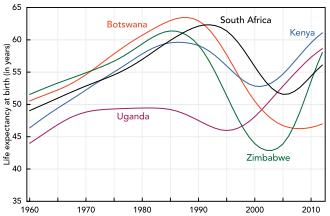Economic impact of HIV/AIDS

The economic impact of HIV/AIDS is profound and multifaceted, affecting individuals, households, businesses, and national economies. The HIV/AIDS epidemic has significant implications for economic growth, labor markets, and public spending.
Impact on Individuals and Households[edit]
HIV/AIDS can lead to a reduction in the labor supply as infected individuals may be unable to work due to illness. This loss of productivity can result in decreased household income and increased poverty. Additionally, households may face increased medical expenses and the cost of caring for sick family members, further straining financial resources.
Impact on Labor Markets[edit]
The epidemic affects the labor market by reducing the available workforce and increasing absenteeism. Skilled workers, particularly in sectors such as healthcare and education, may be disproportionately affected, leading to a loss of human capital. This can hinder economic development and reduce the overall productivity of the economy.
Impact on Businesses[edit]
Businesses may experience increased costs due to higher healthcare expenses, the need to train replacement workers, and reduced productivity. The loss of experienced employees can also affect the quality of goods and services. In some cases, businesses may face reduced demand for their products if consumers' disposable income decreases due to the epidemic.
Impact on National Economies[edit]
At the national level, the HIV/AIDS epidemic can slow economic growth by reducing the labor force and increasing healthcare expenditures. Governments may need to allocate more resources to healthcare and social services, potentially diverting funds from other critical areas such as education and infrastructure. The epidemic can also affect foreign investment and tourism, further impacting economic stability.
Public Health Expenditures[edit]
The cost of treating and preventing HIV/AIDS can place a significant burden on public health systems. Governments may need to invest in antiretroviral therapy, prevention programs, and support services for affected individuals. These expenditures can strain public budgets and limit the ability to address other health issues.
Long-term Economic Consequences[edit]
The long-term economic consequences of HIV/AIDS include reduced economic growth, increased poverty, and greater inequality. The epidemic can undermine efforts to achieve sustainable development and improve living standards, particularly in heavily affected regions.
Related Pages[edit]
Categories[edit]
Ad. Transform your life with W8MD's Budget GLP-1 injections from $75


W8MD offers a medical weight loss program to lose weight in Philadelphia. Our physician-supervised medical weight loss provides:
- Weight loss injections in NYC (generic and brand names):
- Zepbound / Mounjaro, Wegovy / Ozempic, Saxenda
- Most insurances accepted or discounted self-pay rates. We will obtain insurance prior authorizations if needed.
- Generic GLP1 weight loss injections from $75 for the starting dose.
- Also offer prescription weight loss medications including Phentermine, Qsymia, Diethylpropion, Contrave etc.
NYC weight loss doctor appointmentsNYC weight loss doctor appointments
Start your NYC weight loss journey today at our NYC medical weight loss and Philadelphia medical weight loss clinics.
- Call 718-946-5500 to lose weight in NYC or for medical weight loss in Philadelphia 215-676-2334.
- Tags:NYC medical weight loss, Philadelphia lose weight Zepbound NYC, Budget GLP1 weight loss injections, Wegovy Philadelphia, Wegovy NYC, Philadelphia medical weight loss, Brookly weight loss and Wegovy NYC
|
WikiMD's Wellness Encyclopedia |
| Let Food Be Thy Medicine Medicine Thy Food - Hippocrates |
Medical Disclaimer: WikiMD is not a substitute for professional medical advice. The information on WikiMD is provided as an information resource only, may be incorrect, outdated or misleading, and is not to be used or relied on for any diagnostic or treatment purposes. Please consult your health care provider before making any healthcare decisions or for guidance about a specific medical condition. WikiMD expressly disclaims responsibility, and shall have no liability, for any damages, loss, injury, or liability whatsoever suffered as a result of your reliance on the information contained in this site. By visiting this site you agree to the foregoing terms and conditions, which may from time to time be changed or supplemented by WikiMD. If you do not agree to the foregoing terms and conditions, you should not enter or use this site. See full disclaimer.
Credits:Most images are courtesy of Wikimedia commons, and templates, categories Wikipedia, licensed under CC BY SA or similar.
Translate this page: - East Asian
中文,
日本,
한국어,
South Asian
हिन्दी,
தமிழ்,
తెలుగు,
Urdu,
ಕನ್ನಡ,
Southeast Asian
Indonesian,
Vietnamese,
Thai,
မြန်မာဘာသာ,
বাংলা
European
español,
Deutsch,
français,
Greek,
português do Brasil,
polski,
română,
русский,
Nederlands,
norsk,
svenska,
suomi,
Italian
Middle Eastern & African
عربى,
Turkish,
Persian,
Hebrew,
Afrikaans,
isiZulu,
Kiswahili,
Other
Bulgarian,
Hungarian,
Czech,
Swedish,
മലയാളം,
मराठी,
ਪੰਜਾਬੀ,
ગુજરાતી,
Portuguese,
Ukrainian
